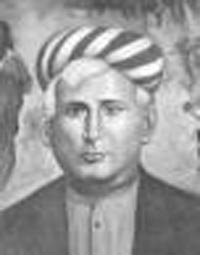
The Bengali novelist Bankimchandra Chatterji (1838-1894) was the first writer to use the Western form of the novel successfully in an Indian language.
Bankimchandra Chatterji was born on June 26, 1838, in the village of Kanthalpara near Calcutta. His father, Jadavchandra, an orthodox Kulin Brahmin, was a deputy collector of revenues. Bankimchandra received much of his early traditional Hindu education from a family priest. He was married at the age of 11 to a girl of 5 and in the same year, 1849, was enrolled in Hooghly College.
At Hooghly College, and later at Presidency College, Calcutta, Bankimchandra’s education became almost entirely Western, with an emphasis on science, history, language, law, and philosophy. In 1858 he became one of the first two students to earn a baccalaureate from newly founded Calcutta University. Immediately after graduation he was appointed a deputy collector by the British colonial government and remained in that position without promotion for 33 years. He retired in 1891. But while he was a government official, he began to write novels in his spare time. He is said to have suffered from diabetes for some years, and he died 2 years after his retirement, on April 8, 1894.
Bankimchandra wrote his first novel, Rajmohan’s Wife (1864), in English. Thereafter he wrote 14 novels in Bengali from 1865 to 1884. He combined Sanskritized and colloquial Bengali in a manner that made it for the first time an adequate vehicle for expressing a wide range of subjects that hitherto had had to be stated in Sanskrit or English. His first Bengali novel, Durgeshnandini (1865), is said to have created a sensation in Calcutta. Bengalis had read English novelists, like Sir Walter Scott, but Bankimchandra’s novels were the first that gave them a satisfying semblance of their own world in fictional form. His first three novels were pure romance decked out in historical costume. While the history in these and in later novels with historical themes was often inaccurate, the bravery of the heroes and the beauty, endurance, and self-sacrifice of the heroines served to inspire Bengalis with notions of a glorious past.
In his social novels Bankimchandra was bold for his time in creating characters who broke with traditional codes of behaviour, but he was careful to see that in the end the conventional prevailed over the unconventional. In his two best social novels, Vishavriksha (1873) and Krishnakanter Will (1878), he explores the questions of extramarital love and remarriage of widows, but by means of suicide and murder he clears the way for convention to win out. Bankimchandra’s works possessed vitality. In the numerous, short chapters, dramatic events happened frequently, humor appeared everywhere, and there was movement, action, and feeling. Many of the names of his fictional characters have passed into the idiom of the language.
Anand Math is a milestone in Bengali literature. The poem Vande Mataram from this book is the National Song of India.
